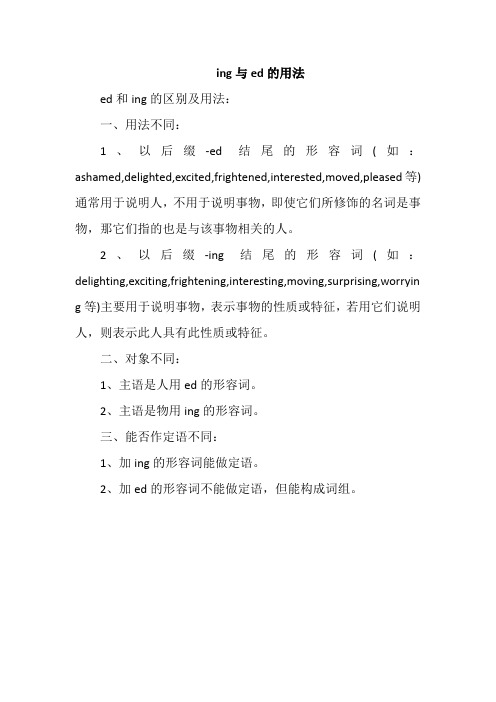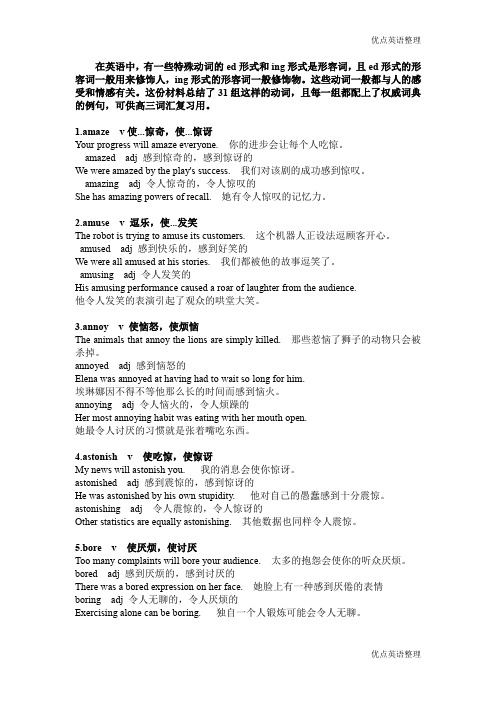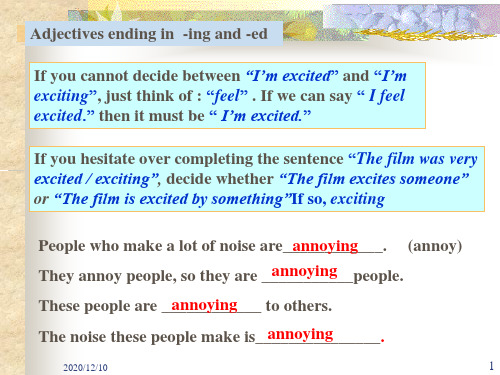ing结尾和ed结尾的形容词对比PPT课件
ing与ed的用法

ing与ed的用法
ed和ing的区别及用法:
一、用法不同:
1、以后缀-ed结尾的形容词(如:ashamed,delighted,excited,frightened,interested,moved,pleased等)通常用于说明人,不用于说明事物,即使它们所修饰的名词是事物,那它们指的也是与该事物相关的人。
2、以后缀-ing结尾的形容词(如:delighting,exciting,frightening,interesting,moving,surprising,worryin g等)主要用于说明事物,表示事物的性质或特征,若用它们说明人,则表示此人具有此性质或特征。
二、对象不同:
1、主语是人用ed的形容词。
2、主语是物用ing的形容词。
三、能否作定语不同:
1、加ing的形容词能做定语。
2、加ed的形容词不能做定语,但能构成词组。
-ed 和-ing结尾的形容词

-ed 和-ing结尾的形容词amazing令人惊异的;amazed 感到惊异的amusing 有趣的,好笑的;amused 觉得好笑的boring令人讨厌的;bored感到厌烦的confusing令人困惑的;confused 感到困惑的disappointing令人失望的;disappointed 感到失望的disturbing令人不安的;disturbed 心神不安的encouraging令人鼓舞的;encouraged 受到鼓励的entertaining愉快的,有趣的;entertained 感到愉快的freezing 冰冻的,严寒的;frozen 冻僵了的frightening 令人害怕的;frightened 感到害怕的inspiring 令人鼓舞的;inspired受到鼓舞的interesting 令人感兴趣的;interested感兴趣的moving 感动人的;moved 受感动的pleasing 令人高兴的;pleased 感到高兴的puzzling 令人不解的;puzzled 感到不解的surprising 令人惊讶的;surprised 感到惊讶的touching 令人感动的;touched 受感动的worrying令人担忧的;worried 感到担忧的tiring令人疲劳的tired劳累的embarrassing 令人尴尬的embarrassed 感到尴尬的exhausting令人精疲力竭的exhausted精疲力竭的convincing 令人信服的convinced相信的fascinating 迷人的,有吸引力的fascinated 着迷的annoying令人生气的annoyed生气的relaxing令人轻松的relaxed 轻松的,放松的练习1.Yesterday our head teacher made such an ______ speech that we all felt _____.excited, exciting2.Jack knows ____ little English that he has never found an ____ job.such, so, excited, exciting3.From the ____ look on his face, I could tell that he failed in the exam.disappointed disappointing4.Those relatives were ____ people. After a few days, I was getting _____ and homesick.boring, bored,5.Find the ____ look on the students’ faces, the professor felt ____ about his explanation. Confusing, confused , embarrassing, embarrassed。
高考常见v-ed和v-ing 做形容词课件

在英语中,有一些特殊动词的ed形式和ing形式是形容词,且ed形式的形容词一般用来修饰人,ing形式的形容词一般修饰物。
这些动词一般都与人的感受和情感有关。
这份材料总结了31组这样的动词,且每一组都配上了权威词典的例句,可供高三词汇复习用。
1.amaze v使...惊奇,使...惊讶Your progress will amaze everyone. 你的进步会让每个人吃惊。
amazed adj 感到惊奇的,感到惊讶的We were amazed by the play's success. 我们对该剧的成功感到惊叹。
amazing adj 令人惊奇的,令人惊叹的She has amazing powers of recall. 她有令人惊叹的记忆力。
2.amuse v 逗乐,使...发笑The robot is trying to amuse its customers. 这个机器人正设法逗顾客开心。
amused adj 感到快乐的,感到好笑的We were all amused at his stories. 我们都被他的故事逗笑了。
amusing adj 令人发笑的His amusing performance caused a roar of laughter from the audience.他令人发笑的表演引起了观众的哄堂大笑。
3.annoy v 使恼怒,使烦恼The animals that annoy the lions are simply killed. 那些惹恼了狮子的动物只会被杀掉。
annoyed adj 感到恼怒的Elena was annoyed at having had to wait so long for him.埃琳娜因不得不等他那么长的时间而感到恼火。
annoying adj 令人恼火的,令人烦躁的Her most annoying habit was eating with her mouth open.她最令人讨厌的习惯就是张着嘴吃东西。
ed形容词和ing形容词

–ed形容词和–ing形容词的用法区别1,以后缀–ed结尾的形容词(如ashamed, delighted, excited, frightened, interested, moved, pleased, surprised, worried等)通常用于说明人,不用于说明事物,即使它们所修饰的名词是事物,那它们指的也是与该事物相关的人。
如:He had a pleased smile on his face.他脸上露出了满意的微笑。
He told me the news in a very excited voice.他声音很激动地告诉了我这个消息。
原则上,-ed 形容词通常直接用于说明人,若修饰事物,则多为air(神态), appearance(外貌), cry(哭声), face(表情), voice(声音), mood(情绪)等显示某人的情感状况的名词。
2. 以后缀-ing 结尾的形容词(如delighting, exciting, frightening, interesting, moving, surprising, worrying 等)主要用于说明事物,表示事物的性质或特征,若用它们说明人,则表示此人具有此性质或特征。
如:The story is very interesting. 这个故事很有趣。
The man is very interesting. 这个人很有趣。
请再比较并体会以下句子:He is frightened. 他很害怕。
He is frightening. 他很吓人。
He has a frightened look on his face. 他脸上带有惊恐的神情。
He has a frightening look on his face. 他脸上带有吓人的神情。
I read an interested expression on his face. 我看到他脸上露出一种感兴趣的表情。
Unit 5 Our school life 形容词-ing和-ed结尾的区别课件仁爱版英语七年级下

形容词以-ed结尾:描述人们的对某件事物的感受。 形容词以-ing结尾:描述某件事情导致了某种情绪。
A boring math lesson makes you feel bored. The math lesson is what causes you to feel bored The math lesson is boring
形容词以-ing结尾:描述某件事情导致了某种情绪。
1. Have you seen that film? It's really frightening. 2. I could listen to her for hours. She's so interesting. 3. I can't sleep! That noise is really annoying.
形容词-ed结尾和-ing结尾的区别
你能说几个形容词以-ed结尾和-ing结尾的词么?
amaze bore excite interest disappoint relax
amazed bored excited interested disappointed relaxed
amazing boriointing relaxing
形容词以-ed结尾:描述人们的对某件事物的感受。 形容词以-ing结尾:描述某件事情导致了某种情绪。
A tiring job makes you feel tired.
He is bored. The book is boring.
She is interested in the book. The book is interesting.
He is worried about his hair. His hair is worrying.
英语-8-ed形容词和-ing形容词

第八讲 -ed形容词和-ing形容词一学习目标1.了解–ed形容词和-ing形容词的区别二考点解析⊙–ed形容词和-ing形容词的区别-ed形容词,意为“感到…”;-ing形容词,意为“(某事物)令人…” interested / interesting; excited / exciting; frightened / frightening; surprised / surprising; pleased / pleasing; moved / moving; disappointed / disappointing等。
He told me the news in an excited voice.The man is interesting.另外,glad, happy, sorry, angry, thankful, proud等的主语也只能是人;而pleasant, easy, difficult, important等则通常以事物或it作主语,因为它们是说明事物的。
—I’m very ________ with my own cooking. It looks nice a nd smells delicious.—Mn, it does have a ________ smell.A. pleasant; pleasedB. pleased; pleaseC. pleasant; pleasantD. pleased; pleasant三练习题一用括内所给动词的-ed形式或-ing形式填空1. The children were ____after the trip. (tire)2. The trip was____. (tire)3. The ____children went to bed early after the trip. (tire)4. The ____trip lasted a whole day. (tire)5. The trip made the children____. (tire)6. The bad weather made the trip____. (tire)7. Tom’s parents are ____ at his ____ results of the exams.(disappoint)8. ____and angry, he left the meeting-room. (disappoint)9. It is ____that he didn’t pass the examination.(disappoint)10. When hearing the____ news that Michael Jackson passed away, they were____to look at each other. (surprise)11. He was ____ about his ____ son. (worry)12. I'm not ____with his interpretation of this sentence. (satisfy)13. He was ____with the ____person. (annoy)14. A police car appeared on the road, the thief had a____ look on his face. (frighten)15. The situation here is ____and we are____. (encourage)二巩固练习:1. The wet weather will continue tomorrow when a cold front ______to arrive.(2008·全国卷I)A. is expectedB. is expectingC. expectsD. will be expected2. —Do you know if Terry will go camping this weekend? (2008·上海高考)—Terry? Never! He _____ tents and fresh air!A. has hatedB. hatedC. will hateD. hates3. By the time he realizes he ____ into a trap, it’ll be too late for him to do anything about it.A. walksB. walkedC. has walkedD. had walked4. So far this year we ______ a fall in house prices by between 5 and 10 percent. (2008·福建高考)A. sawB. seeC. had seenD. have seen5. Some of the people who ________ to the party can’t e no w. (2008·烟台模拟)A. had been invitedB. have been invitedC. are invitedD. invitedws that punish parents for their little children’s actions against the laws get parents _____.A. worriedB. to worriedC. worryingD. worry7. The little boy isn’t getting on well in maths and worse still, he is even unwilling to go to school. With her son _____, she feels very ______.A. disappointing; worryingB. disappointing; worriedC. disappointed; worriedD. disappointed; worrying8. After the Anti-terrorist War, the American soldiers returned home, ______.A. safe but tiredB. safely but tiredC. safe and tiringD. safely and tiring9. As we all know, typing is a ______ job to a ______ heart.A. tired; tiredB. tired; tiringC. tiring; tiredD. tiring; tiring10. Poor boy! His________ looks and ________hands suggested he was very afraid.A. frightful; tremblingB. frightened; tremblingC. frightening; trembledD. frightened; trembly11._____ do you think of your English teacher? Is he _______?A. What, interestingB. What, interestedC. How, interestingD. How, interested参考答案:一1.tired2. tiring3. tired4. tiring5. tired6. tiring7. disappointed, disappointing)8.Disappointed9. disappointing 10. surprising; surprised 11. worried; worrying12. satisfied 13. annoyed; annoying 14. frightened 15. encouraging; encouraged二1-5 ADCDB 6-11ABACBA。
动词ing和 ed作形容词PPT教学课件

3. I’m __t_ir_e_d___( tire) of watching TV; let’s go to bed. 4. You look __t_r_o_u_b_le_d_( trouble ) ; is anything worrying you? 5. The __tr_o_u_b_l_i_n_g_( trouble ) news kept them awake all night. 6. The _t_ir_i_n_g_____(tire) work made them lose their temper. 7. The employer seemed ___s_a_ti_s_fi_e_d___(satisfy) with her work.
11. I’m very __in_t_e_r_e_st_e_d__(interest) in history.
2020/12/10
3
1. They were __w_o_r_r_ie_d___(worry ) that the hijackers will make further demands.
People who make a lot of noise are__a_n_n_o_y_in__g___. (annoy) They annoy people, so they are __a_n_n_o_y_in__g__people.
These people are __a_n_n_o_y_in__g___ to others. The noise these people make is__a_n_n_o_y_i_n_g______.
ing和ed结尾的形容词大全及辨析1

以ing和ed结尾的形容词的区别By Uganenglish1. 以ing结尾的动词变化而来的形容词一般修饰物,译为“令人…的”,常作定语;exciting news,主要用于说明事物,表示事物的性质或特征,若用它们说明人,则表示此人具有此性质或特征。
2. 以-ed结尾的动词变化而来的形容词一般修饰人,译为“(人)…的”,常作表语;Iam excited. 通常用于说明人,不用于说明事物,即使它们所修饰的名词是事物,那它们指的也是与该事物相关的人。
十五组形容词:encouraging 令人鼓舞的interesting 有趣的astonishing 令人惊呆的surprising 令人惊奇的moving 令人感动的frightening 令人害怕的terrifying 令人恐惧puzzling 令人困惑不解的satisfying 令人满意的 tiring 令人厌倦的 amazing 令人惊讶的 boring 令人讨厌的exciting 令人兴奋的touching 触动人心的embarrassing 令人尴尬的encouraged 受到鼓舞的interested 感兴趣的astonished 惊呆的surprised 感到好奇的moved 感动的 frightened 害怕的 terrified 感到恐惧的 puzzled 感到困惑的satisfied 感到满意的 tired 感到厌烦的 amazed 感到惊讶的 bored 感到厌烦的excited 感到激动的touched 感动的embarrassed 尴尬的1. He had a pleased smile on his face. 他脸上露出了满意的微笑。
2. He told me the news in a very excited voice. 他告诉了我这个消息,声音很激动。
3. The story is very interesting. 这个故事很有趣。
